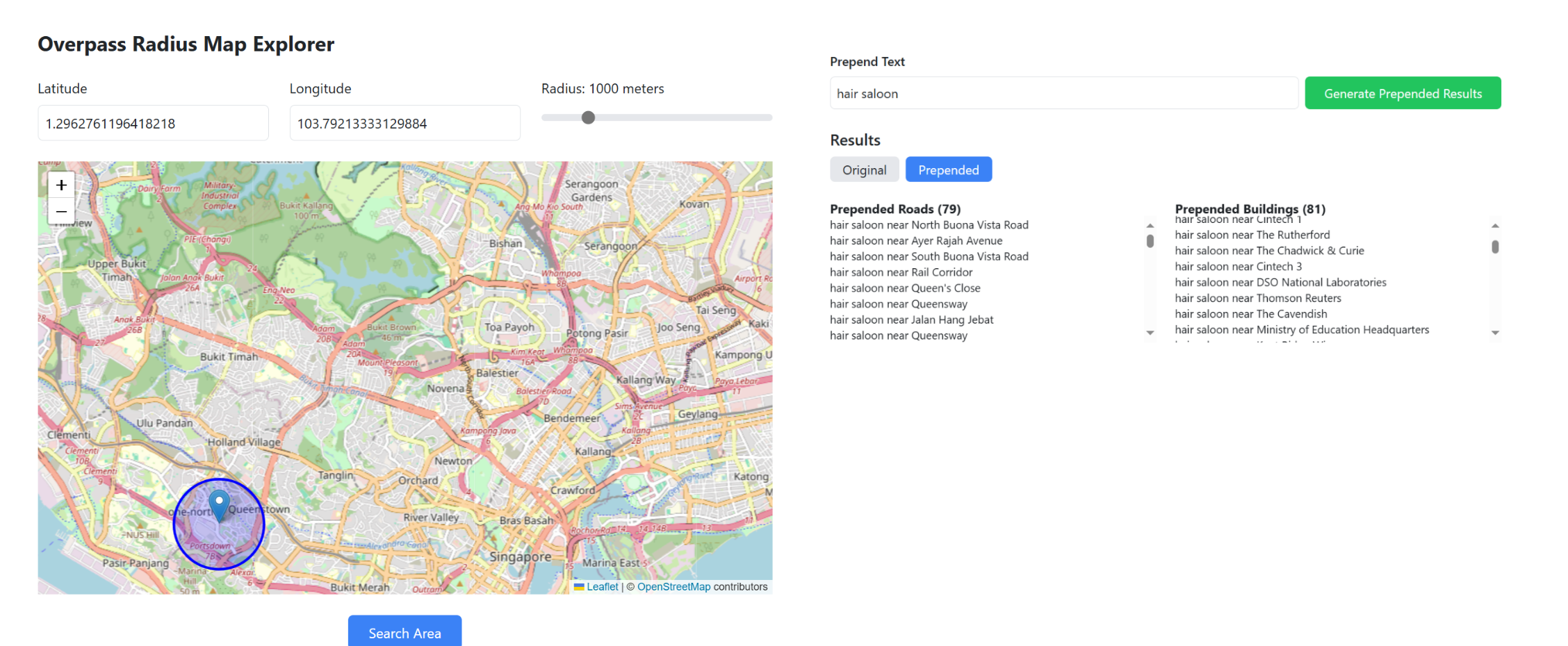
The Challenge
Most SEM campaigns bleed budget on generic searches with unclear intent. Someone searching “coffee shop” could be researching franchises, writing an article, or just browsing. But someone searching “coffee shop Orchard Road” or “cafe near Raffles Place”? They’re ready to visit. Right now.
The difference is geographic intent—and it signals buying intent.
Yet most businesses struggle to systematically identify these location-based keyword opportunities. Manual research is tedious and incomplete. You might know the main streets in your area, but what about the side roads? The building names? The landmarks that locals actually use when searching?
The question is: How do you discover these high-intent geographic keywords at scale, without spending hours on manual research?
The Solution: Overpass Map Explorer
The Overpass Map Explorer transforms OpenStreetMap’s vast geographic database into actionable SEM intelligence. By leveraging the Overpass API, it extracts real-world location data—road names, building names, landmarks—within any radius you specify, then pairs them with your business type to generate location-specific search terms.
This isn’t just keyword research. It’s geographic intent mapping.
Key advantages include:
- Systematic Coverage: Discover every road name, building, and landmark in your target area—not just the ones you already know
- Competitive Intelligence: Find location-specific keywords your competitors aren’t bidding on yet
- Scalable Research: Generate hundreds of geo-targeted keywords in minutes, not hours
- Real-World Relevance: Based on actual OpenStreetMap data that reflects how people navigate and search
- Zero Cost: Free, open-source geographic data that commercial tools charge for
How It Works
1. Location Targeting
Set your geographic focus by either:
- Dragging the map marker to your target location
- Entering latitude/longitude coordinates directly
- Adjusting the radius slider to define your search area (e.g., 500m, 1km, 5km)
The tool uses OpenStreetMap’s Overpass API to query all geographic features within this boundary.
2. Data Extraction
The system retrieves comprehensive location data including:
- Road names: Major streets, minor roads, alleys
- Building names: Commercial buildings, landmarks, shopping centers
- Place names: Neighborhoods, districts, local references
This data represents real-world geography that your customers actually use when searching.
3. Business Context Addition
Add your prepend text—the business type or service you want to pair with these locations:
- “cafe near”
- “restaurant”
- “gym”
- “coworking space”
- “storage unit”
- “pharmacy near”
The tool combines your business context with each geographic feature, creating natural, high-intent search queries.
4. Keyword Generation
The system outputs a formatted list of location-based search terms ready for your SEM campaigns:
cafe near Orchard Road
cafe near Bras Basah Road
cafe near ION Orchard
cafe near Ngee Ann City
cafe near Wheelock Place
...
These aren’t theoretical keywords. They’re real search queries that potential customers use when they’re ready to take action.
The Results
Higher Conversion Rates: Geographic intent correlates directly with buying intent. Users searching with location context are ready to visit or purchase—unlike generic searchers who may just be browsing.
Lower Competition: While everyone bids on generic terms like “cafe” or “coffee shop,” location-specific longtail keywords often have lower CPCs and less competition.
Comprehensive Coverage: Discover keywords your competitors miss. Most businesses only target main streets or landmarks they know—you’ll capture searches for every road and building in your area.
Scalable Intelligence: What would take days of manual research happens in minutes. Expand to multiple locations or cities without proportionally increasing research time.
Actionable Data: Export your keyword list directly into Google Ads, Microsoft Advertising, or any SEM platform. No additional formatting needed.
Why It Matters
In SEM, intent is everything. The difference between someone “just looking” and someone “ready to buy” often comes down to a single geographic qualifier in their search query.
Traditional keyword research focuses on what people search for. Geographic intent research focuses on where they want to find it—and that’s the difference between awareness and conversion.
By systematically mapping real-world geography to your business offering, you transform OpenStreetMap’s data into a competitive SEM advantage. You’re not just bidding on keywords. You’re bidding on intent.
Ready to discover the geographic keywords your competitors are missing?
Access the Overpass Map Explorer or reach out to discuss how location-based SEM can be customized for your specific market.
